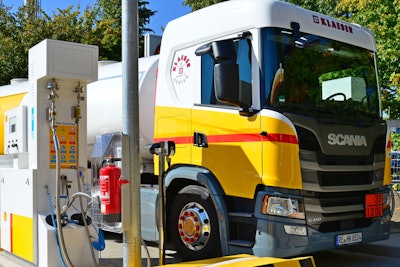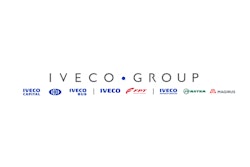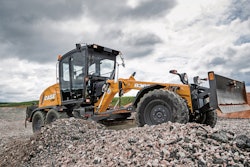
A consortium called BioLNG EuroNet has announced a commitment to the further expansion of LNG (liquefied natural gas) as a road transport fuel across Europe with new infrastructure that should ensure the long-term success and mass scale adoption.
The consortium, comprising Shell, Disa, Scania, Osomo and Iveco will each deliver separate activities that will see 2,000 more LNG trucks on the road, 39 LNG fueling stations and the construction of a bioLNG production plant in the Netherlands.
The LNG Retail stations will form part of a pan-European network and be built in Belgium, France, Germany, the Netherlands, Poland and Spain. The stations will be located approximately every 400 km along core road network corridors from Spain to Eastern Poland.
"LNG is an increasingly affordable fuel for heavy goods vehicles which will make it an important energy source as the transport sector evolves," says Istvάn Kapitάny, Executive Vice President, Shell Retail. "Shell is committed to offering our customers more lower carbon energy and the new LNG Retail stations are a vital piece of the puzzle. I look forward to seeing this important network of stations welcome European motorists in the years to come."
The bioLNG facility will produce 3000 MT/year of BioLNG and will use biomethane produced from waste. This will be sold to end-users via the LNG network.
"This program covers filling stations, biofuel production and subsidies which are all necessary for progressive customers to invest in the trucks, despite the extra initial cost," says Jonas Nordh, Director Sustainable Transport Solutions, Scania. "Whilst LNG which reduces CO2 emissions by about 20%, is more broadly available today, biogas, which reduces CO2 emissions by over 90%, can increasingly be blended in with the natural as production of biogas is ramped up."
BioLNG EuroNet has an aspiration to rollout the expansion of LNG as a road transport fuel across Europe even further in the future.
About the project
- The BioLNG Euronet project is bringing together major players in the European market: Shell, DISA, Osomo, Scania and Iveco. These project partners aim to help the European Union meet its goal of a 60% reduction in CO2 emissions by 2030, by triggering long-term decarbonization of heavy-duty road transport across mainland Europe.
- The bioLNG facility to be constructed in the Netherlands will collect municipal waste from supermarkets and restaurants and process this into biogas. The technology will use new patented membrane separation technology that will enable biologically derived LNG.
- The 2,000 new LNG Heavy Goods Vehicles will be leased to end users through competitive financing and trucking solutions to reduce the cost of them. Only the additional costs of an LNG HGV compared to a diesel truck will be financed. The average eligible costs for each LNG truck are capped to a maximum of €30,000.
- The energy density of bioLNG means that trucks can travel longer distances, better suiting the needs of transport operators now, and in the future. Due to the use of industrial organic waste as a resource, the CO2 emissions will be much lower than the CO2 emissions of traditional fuels. BioLNG is essential in achieving the long-term aim of further decarbonization for the road transport sector in Europe by 2030. BioLNG virtually eliminates sulphur and offers a reduction in NOx and particulate matter.
- Each BioLNG EuroNet consortium member will receive 20% funding from the EU towards the cost of their commitments.
- The EU funding received by the BioLNG EuroNet consortium members falls under the connecting Europe facility (CEF) for the transport sector.
- Directive 2014/94/EU of the European Parliament and of the Council of October 22, 2014 on the deployment of alternative fuels infrastructure defines a common framework of measures for the deployment of alternative fuels infrastructure in the European Union and to mitigate the environmental impact of transport. It sets out minimum requirements for the building-up of alternative fuels infrastructure, including LNG (Liquefied Natural Gas) and Compressed Natural Gas (CNG).



















